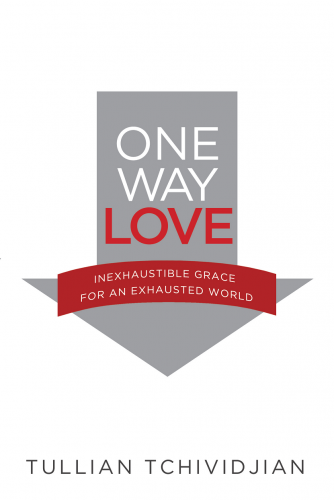
Well, it’s getting close to time to lay down the pen, beat swords into plowshares, etc. Tullian Tchividjian’s fantastic new book, One Way Love: Inexhaustible Grace for an Exhausted World (out today!), says so much of what the Church–and all of us!–needs to hear. In Tullian’s own words,
The Christian faith has often been perceived as the ultimate vehicle of conditionality… once you made that initial Christian commitment, it was time to get your act together and be serious. We conclude that it was God’s blood, sweat and tears that got us in, but that it’s our blood, sweat, and tears that keep us in.
 This is the contemporary Church’s largest issue, and One Way Love aims to dispel that myth – not a myth we necessarily would voice belief in, but one that we all, nonetheless, prove our subconscious assent to every single day. It’s a problem that requires intellectual deconstruction (which Tullian amply provides), and also needs redress at the emotional level – hence the numerous and wonderful illustrations which anchor the grace message throughout the book.
This is the contemporary Church’s largest issue, and One Way Love aims to dispel that myth – not a myth we necessarily would voice belief in, but one that we all, nonetheless, prove our subconscious assent to every single day. It’s a problem that requires intellectual deconstruction (which Tullian amply provides), and also needs redress at the emotional level – hence the numerous and wonderful illustrations which anchor the grace message throughout the book.
Reviewing One Way Love presents some difficulties and awkwardness, since Mockingbird’s influence – and especially Paul and David Zahl’s – is legible in the acknowledgments, works cited, and the text itself. Even the title is a direct shout-out to PZ! Many of our favorite familiar themes are there: the lust for control that itself controls us (to update Augustine a bit), Luther’s sharp distinction between Law and Gospel and his insight into their role in our lives, all the refracted “little-l” laws comprising our incorrigible “performancism”, the subtle co-optation of large swaths of Christianity by contemporary American self-help, a view toward providing comfort to burnt-out Christians, the impossibility of true antinomianism, Christ’s heightening of the Law in the Sermon on the Mount, and much more.
And so the first thing I’d say about OWL is that it will from now on be the book I give to anyone who is interested in an alternative to moralistic Christianity. I wish I had read it years ago; it would’ve been immensely challenging and comforting, simultaneously. It’s the clearest and most accessible iteration of God’s one-way love for sinners around, and for precisely that reason, it’s absolutely crucial and irreplaceable for the contemporary American Church.
It’s very easy to find churches that are extraordinarily compassionate and welcoming, but do not adhere strongly to the fundamentals (Incarnation, Atonement, Resurrection, Eschaton) of the Christian faith. It’s perhaps even easier to find churches that take these fundamentals with the utmost seriousness, but somehow these fundamentals’ continual bent towards grace – and thus away from behavior-modification and self-righteousness – do not come through at all. The ‘middle way’ here is utmost seriousness about Christianity which, if it is truly believed, must as a matter of course develop a lapidary focus on grace as God’s own economy of relating to us. Tullian’s new book maps out this middle way beautifully, and the Church could benefit immensely by taking it to heart.

Proof that the author’s stories about being an insufferable teenage punk are not fabricated.
Because of the importance of One Way Love’s message, the audience is as broad as possible; everyone could benefit from reading it, from your non-religious friend to your churchgoing grandmother. Endowing the book with this measure of appeal and accessibility necessarily involves being welcoming to those readers who are “short on grace and long on law.” And so One Way Love doesn’t sing in quite the same inassimilable style as Robert Capon’s Between Noon and Three or PZ’s Grace in Practice, but it sings every bit as sweetly. The endorsements list (including Rick Warren and Max Lucado) reveals a certain amount of latitude for interpretation by readers – i.e. Tullian is gracious enough not to spell out too many specifics about what an absence of one-way love looks like – but this broadening pays off in the book’s potential to pull an extraordinarily broad range of people towards the message of grace alone (as opposed to “grace a lot” as he so memorably points out).
This isn’t to suggest that OWL doesn’t have teeth. Not at all! In fact, a less capable writer would not be able to “sell” such an assault on our inner Pharisees in such gut-level terms, certainly not to the extent that Tullian does. But he writes so winsomely that such un-popular, un-self-helpy material shows forth in its proper beauty, the promise of him who came “to set the captives free.” I’ll let the book speak for itself:
The ironic thing about legalism is that it not only doesn’t make people work harder, it makes them give up. Moralism doesn’t produce morality; rather, it produces immorality. The Onion brilliantly parodied this dynamic with its article, “Where Are All These ‘Loose Women’ My Pastor Keeps Warning Me About?,” in which a fictional seventeen-year-old kid laments that he never seems to run into any of the promiscuous ladies that he hears about at church so often. The humor is based in reality. It is no coincidence, for example, that the straight-laced Leave it to Beaver generation preceded the free-love movement of the 1960s. We live in a country where the state most known for its wholesomeness, Utah, also leads the country in rates of pornography consumption and antidepressant prescriptions.
Humor, clarity, and profound insight into everyday life combine to make the message of grace not merely convincing, but borderline irrefutable on the grounds of real human experience. In fact, considering his context, the autobiographical vignettes Tullian presents throughout the book, alternately self-deprecating and tear-jerking, sometimes even humiliating, are courageous. This is clearly not a mental exercise in “radical this” or “radical that”. Tullian not only believes what he’s writing, but the arresting honesty with which he does so (none too common in those coming from his context, to say the least) testifies to a deep personal integration with the book’s liberating message.
One criticism I’ve heard of Mockingbird – one that some might level at OWL – is that the grace message becomes something simply to be understood. “If I can just get grace, mentally and emotionally, at a deep enough level, then I’ll have gratitude, spontaneous good-will, etc.” The fact that Christ gives us even our understanding – and that it comes through concrete experience rather than properly-formulated theological propositions – is a warning always to be kept in mind. But One Way Love itself is so steeped in human experience, and so steeped in the Bible’s own storytelling ability, that the message remains far from merely cerebral. His biblical insight is at once immensely imaginative and faithful to the Bible’s own account:
The story of Zacchaeus gives us a window into Christ’s love for sinners… As the chief tax collector, the Jewish establishment would have despised him because he collected taxes from Rome, an act that was considered both traitorous and sinful. Yet as a Jew, he would have been shunned by his imperial employers as well. Even the other tax collectors would have hated him, because he likely cheated them, too, skimming funds off the top of their ill-gotten cash. Add to the mix an inevitable Napoleon complex, and you have a picture of a loathsome loan shark who used his authority to extort his countrymen for both his own personal gain and that of the occupying Roman government. Like [Bernie] Madoff’s, his reputation would have been well-founded, which makes Jesus’s actions even more surprising…
Jesus singled out Zacchaeus, despite the fact that Zacchaeus had not said or done anything to warrant or attract his attention… There was no gesture of repentance, no prayers, no tears, no words! The initiative belonged to Jesus alone.
And so grace just isn’t an idea, and Tchividjian’s Christianity isn’t some new, cerebral self-help paradigm for understanding or taking to heart the grace message. It’s truly a message of rescue and salvation to the dead (Zacchaeus and ourselves), and one grounded in the concrete historical expression of Christ, and the forces of Law and Gospel that, despite their theological underpinnings, refract themselves into every aspect of our own daily lives.
A Christian book can aspire to no more than an accurate and down-to-earth re-presentation of Christ’s life and message for our own times, our contemporary culture, midwifing us through our own concerns into a fresh dialogue with the Jesus of the Gospels, his actions and teachings and birth, death, and resurrection. This book connects those truths home to contemporary readers, and it allows Christ’s message to touch down in our world in the place we need it most–primarily, one suspects, because it has touched down in Tullian’s own life so powerfully.
One Way Love embodies the best conceivable opening to a long, long-overdue conversation within the current-day Protestant Church. My greatest hope for this work is that it will become a classic within the world of Christian books, and will be referenced, studied in small groups, and assigned in church programs for years to come. But its call to the contemporary Church, as important as it is, is only secondary to the book’s real purpose. It is, above all, an elucidation of Christ’s own call to our irrepressible inner Pharisees, our works-obsessed Old Adams, to abandon myths of self-sufficiency and moral high ground that go beyond moralistic Christianity, beyond Evangelicalism and all the way back to Adam and Eve. It’s an entry, first and foremost, into an always-overdue conversation within ourselves, the tension between our desire to “be like God” and God’s own promise that we can gain our lives only by losing them. One Way Love’s message is just as timeless and irrepressible as our own resistance to it, so it will be an immensely valuable conversation partner for years to come.


COMMENTS
Leave a Reply












